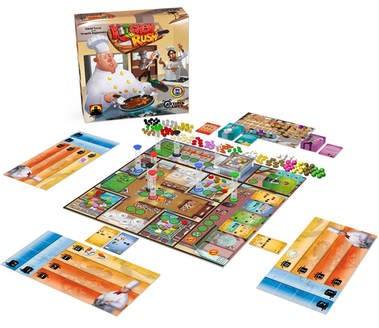 We're moving into May, and Kickstarter is still hopping. Who knows what the rest of this year will bring? For now, here are a few more campaigns that are possibly of interest to solo board gamers. 1) Kitchen Rush: Piece of Cake Kitchen Rush is a real-time game in which you manage multiple timers and try to successfully manage a busy restaurant with a LOT of stuff going on. Now there's an expansion, and since it involves cake, it has to be pretty interesting! I have never played Kitchen Rush myself, and have only really heard comments about it as a cooperative game. At the same time, I can definitely see the appeal of trying to do crazy board game multitasking. Can you really do it by yourself? It seems like the cooperative game might be better for messing up and having a good laugh about it, while trying the game single player would mean challenging yourself to achieve maximum efficiency. 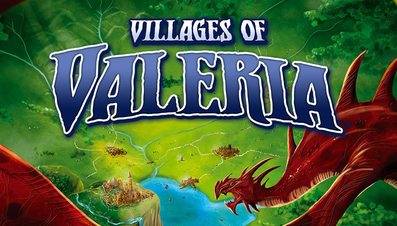 2) Villages of Valeria: Landmarks Here's another expansion campaign, this time for Villages of Valeria. Villages is a building game where you generate and then manage resources, with the goal of recruiting adventures and constructing buildings quickly and efficiently. The expansion adds a new mechanic to the game, which—based on word-of-mouth—already offers a pretty solid solo experience. I am definitely curious about this one, and it's $54 + shipping to pledge for a "catch-up" pack that includes all Kickstarter releases for the game. I will note, however, that all of the previously released material for this game is available in the form of less-expensive retail versions, which might actually be more appealing to me. 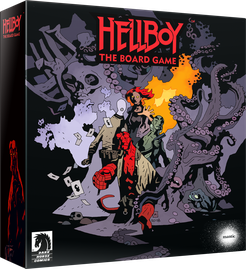 3) Hellboy: The Board Game I like Hellboy, and I like sprawling co-op adventures. This game appears to offer a lot of both. However, it's also very expensive. The base pledge clocks in at $131, and I'm just not good for that right now. But if you want to explore, investigate, and fight as a paranormal investigator from the world of Hellboy, you might like this one. The game has some really nice-looking miniatures. But it also looks like the designers have tried to give players a lot of decisions to make, as well as plenty of replayability.
0 Comments
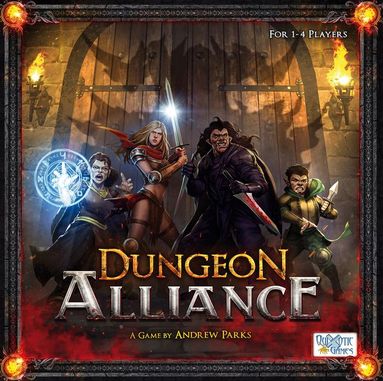 To watch a tutorial for this game, click here. Full disclosure: Andrew Parks kindly provided me with a review copy of Dungeon Alliance. What is this game about? Dungeon Alliance is a game in which you choose four heroes, then have them explore and plunder a dungeon that is a bit different every time. Although the dungeon theme might make you assume that this game is a beat-'em-up, it's actually extremely thinky, in a good way. You have limited time to accomplish your goals, so no turn can be wasted. There are tactical decisions to make, such as where to position your characters on the dungeon tiles and which direction to have them face (it matters). You draft dungeon tiles, so you get to select your next challenge either with plunder and glory in mind or in the service of completing particular quests. You even get a degree of choice in which monsters you activate each turn—choices that have strategic consequences. Even more interestingly, you have to make good decisions when drafting heroes and drafting cards. You use a single deck and a single hand to control special actions for everyone... but not all heroes can use every card. To use particular cards, symbols on your hero cards need to match symbols on the cards you've drafted. As in Mage Knight--to which Dungeon Alliance has a similar vibe—you can also discard cards facedown to force actions that you don't otherwise have the stats for. To grow your deck, you gain experience by killing monsters, then spend the experience to draft cards. Drafted cards are for immediate use and go directly to your hand, which has an impact on which ones you acquire. The more cards you draft, the more you can hold in your hand and the more you can discard in search of more powerful cards that you know are remaining in your deck. As you can see, there are a lot of things to think about when you play Dungeon Alliance—but that's part of the fun! Also, there is no need to try to take it all in at once. There is a "basic" version of the game that helps you get used to the rules before getting crazy with the card combos. It's worth it to ease yourself in. 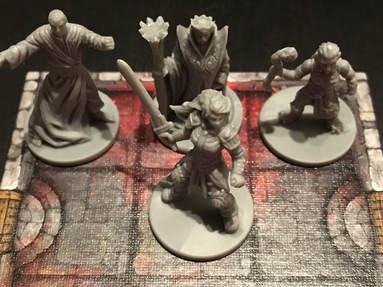 There is just something about groups of four friends delving into a dungeon... There is just something about groups of four friends delving into a dungeon... How does it play solo? I find Dungeon Alliance to be a very satisfying solo experience. Yes, you are controlling an alliance of four characters, but everyone does that in all versions of the game. You still only need to manage one deck and one hand of cards, so it's actually just a matter of choosing which hero to deploy based on the cards you have available to you. I enjoy the challenge of trying to make the most of the cards I've drawn as things escalate in the dungeon itself. There are also special solo and co-op additions to make the game satisfying for a single player. In the competitive multiplayer version of the game, different alliances compete to earn the most XP, and the goal is to have more points than everyone else. You can compete against yourself for points in solo play, and that's not a bad place to start. But you can also add in quests—challenging objectives to complete in order to consider yourself victorious at the end of the game. To simulate an opponent, you will play against AI cards that cause monsters to attack you and that can otherwise affect the board state. Every hero turn, an AI card will do something unpleasant, such as cause you to lose dungeon tiles from the drafting area, cause a card on your market row to be removed from the game completely, or cause an exhausted monster to reactivate. Additionally, at the end of each hero turn, the cards provide instructions for how to move monsters. There are always three options that increase in awfulness. If you aren't in a position to complete options one or two, three will definitely happen and it will be the worst. This often means strategically keeping monsters ready to activate, rather than burning them all out, because a monster attack is probably better than multiple heroes ending up with unblockable poison wounds. 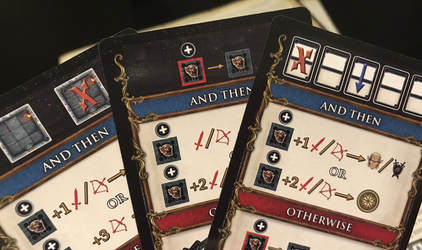 The solo/co-op cards won't let your life get too easy. The solo/co-op cards won't let your life get too easy. Overall Thoughts Dungeon Alliance is an interesting and challenging solo experience, and I'm excited that there will be further expansion material for it. I love the elements of choice I have within the game, as well as the struggle to deploy my heroes and cards as efficiently as possible. Few things in gaming make me happier than a clever card combination, and Dungeon Alliance is a game that is all about maximizing your resources and making the very best choices you can on every turn. I also love choosing different heroes with different symbols, which forces me to draft different cards from game to game. I am a creature of habit, and often go for cards I have enjoyed playing in the past. In Dungeon Alliance, it's not always particularly smart to do that, and I appreciate the push to diversify my strategies. Dungeon Alliance is a big puzzle, and I am completely good with that. I will say, however, that it doesn't feel particularly thematic. You are exploring a dungeon, but there aren't a lot of surprises except for the occasional sprung trap. When you open a door, you know precisely what will be behind it. You often find yourself foregoing more "fun looking" card choices in favor of making the best long term decisions. You should also expect to stop and think a lot. Even when playing with different heroes and cards, the game can take on a "same-y" feel because every turn requires so much contemplation, at least for me! That's okay, though—I actively enjoy thinking through my every move and analyzing my turns to death. Dungeon Alliance is a keeper for me. But it might not be for everyone. Do I recommend it? If you like thinky games with a fantasy flavor, then Dungeon Alliance is for you. It's not crazy, laughing, dice-rolling fun. But it's definitely planning, synergy, deck-building fun. If you like Mage Knight, you might welcome Dungeon Alliance as a game that can scratch some of the same itch without taking as long to play. Although the two games are very different, you can see some inspiration from Mage Knight in Dungeon Alliance. If you like one, odds are you will like the other. Overall Rating: 4 stars Rating Scale: 5 stars — I love it! 4 stars — I really like it. 3 stars — I like it. 2 stars — It's okay. 1 star — Meh. 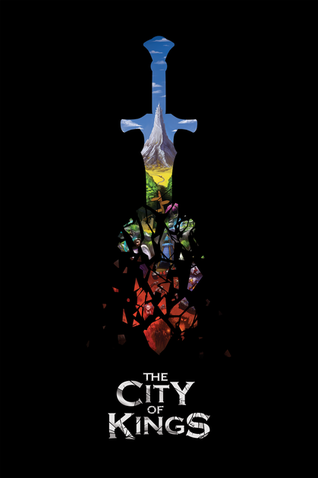 It's almost May, and Kickstarter is offering your wallets no mercy. There are always some more notable solo Kickstarter projects on the scene! 1. City of Kings Reprint If you missed The City of Kings the first time around, here is your chance to change that! City of Kings is back on Kickstarter, along with several expansions and deluxe upgrades. City of Kings is a game that I am legitimately enjoying, and I do recommend having a look at it if it seems like your sort of thing. The one potential problem is that it's expensive.... really expensive. I like the game enough to consider shelling for the new characters and the anti-knock trays I skipped last time, but I need to actually think about my finances before I do it. 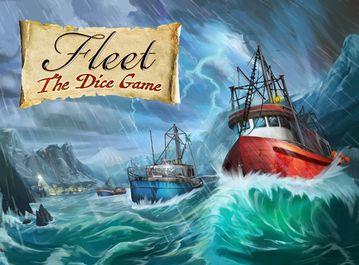 2. Fleet: The Dice Game The original Fleet is good fun, and it's solo-able with the Arctic Bounty expansion. It looks like a fun game of rolling dice, drafting the best ones, and creating the best combos you can as you build your fishing empire. I am definitely interested, especially at the price point—$26 for the deluxe version of the game, plus whatever shipping costs are charged at the end of the campaign. You can also pick up the original Fleet and its expansion at higher pledge tiers. 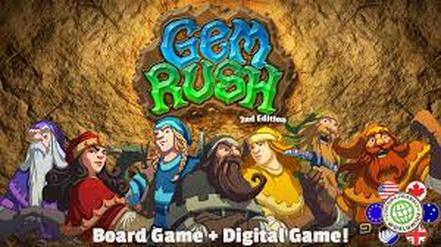 3. Gem Rush Gem Rush is a light, fun game from Victory Point that is being reprinted for their deluxe line. I have the original cheaply-printed, pizza box version of the game, and it's good quick fun. It's only $30 + shipping for a copy of the new edition of the game, but since I already have the first edition, I'm not entirely sure I will splash for it. If you have never owned Gem Rush, however, here is your chance to get a more attractive new version of it! There will also be a digital version of Gem Rush available through Steam, and I am definitely curious about that—although I am also pretty disappointed that there don't seem to be any plans to develop an app for mobile devices. 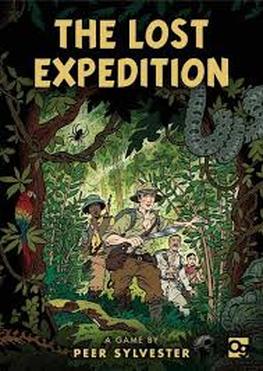 What is this game about? The Lost Expedition is a game in which you control three intrepid explorers who are searching for El Dorado. Your overarching path is a line of nine cards, with your starting card at one end and El Dorado at the other. If one of your explorers reaches the Lost City alive, you win. But odds are, none of them are going to get there. Although there is a lovely main path for your meeple to travel on, the real gameplay happens on the event cards you draw and arrange to order your days and nights. Your explorers must confront the obstacles on the cards by using precious resources: health, ammunition, and food. Almost every event card forces your beleaguered party to face yet another unpleasant decision. Which resources will you sacrifice? Will you try to advance along the path to El Dorado, or will you choose to replenish your food supply instead? The choices aren't easy, and sometimes it seems like there is no set of "correct" choices that would lead a team to victory. How does it play solo? Although The Lost Expedition has cooperative rules, I would say this is a game that is best played solo. You control three explorers, but that is more about resource management—you do not play separate turns for each of them. Also, while The Lost Expedition involves some luck because you are drawing cards, everything else in the game is your decision beyond the hand you are dealt. Can you manipulate events skillfully? Can you make smart calls about which resources to use at what times? In some ways, it's better to make all of the choices yourself—there are few good ones to make, and that's easier to accept when they are all entirely your fault. 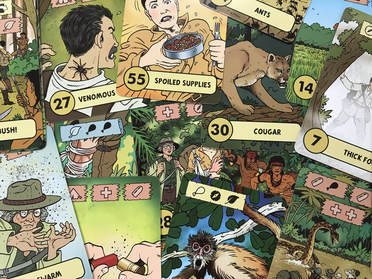 Many "fun" things can happen to you in the Amazon! Many "fun" things can happen to you in the Amazon! Overall Thoughts The Lost Expedition is a clever game that offers an interesting puzzle. Although you can't control the events you draw, you have some say about the order in which they occur, and those choices add tension. Another really nice touch is that the characters in the game—three male and three female—are based on real-life adventurers whose exploits you can read about in a history book. The art is striking, the components are quality, and it's clear the game was made with love. That said, there's something about The Lost Expedition that just doesn't click for me. I don't find myself fully engaged in it. I also don't find myself finishing the game and immediately setting up to try again—something that I almost always end up doing with small, quick games that I enjoy. I think part of the problem may be that the old-world adventurer theme is what attracts me, but I don't really feel that theme in the gameplay. The puzzle that The Lost Expedition presents feels just a little bit too mechanical for me to get engrossed in a story of survival. On top of that, I tend to prefer games in which you get stronger as you go and feel a real sense of progression. The Lost Expedition gives you little to start with, then takes it all from you as the game progresses. Seriously, who goes into the heart of the jungle with only three bullets? Do I recommend it? Not really. I love the theme of The Lost Expedition, but I don't actually have much fun with it. There are other games I'd rather be playing. Overall Rating: 2 stars Rating Scale: 5 stars — I love it! 4 stars — I really like it. 3 stars — I like it. 2 stars — It's okay. 1 star — Meh. There are a lot of active KS projects that I've already covered, but that won't last long. This is Kickstarter we're talking about, after all! And trust me, there are still other games to discuss. 1. Rescue Polar Bears: Data & Temperature In Rescue Polar Bears: D&T, an improvement on the original Rescue Polar Bears, you are a scientist whose job is to collect data in the Arctic. You (and other players, if playing with a group) are on a quest to gather enough information to convince governments around the world that global warming is a serious issue, and that we need to take action to save the polar bears. Additionally, you will rescue polar bears who are out in the freezing water with no ice to climb onto. This is definitely a game with a message. Rescue Polar Bears also has some of the more adorable game pieces I have seen. Look at those polar bears! AWWW! 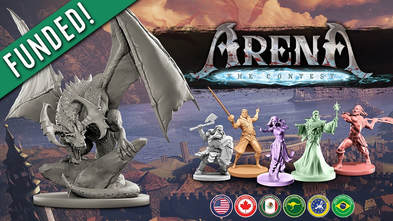 2. Arena: The Contest Arena: The Contest does not have the most exciting name in the world, but it does have a lot of fancy-looking miniatures, and it has well surpassed its funding goal. It is a tactical miniature combat game that promises multiple modes of gameplay, including solo. It also boasts diverse character powers, an array of teams to experiment with, and variable maps. It isn't cheap: The core box is $89. But if you are looking for another tactical minis game, it might we worth a look. 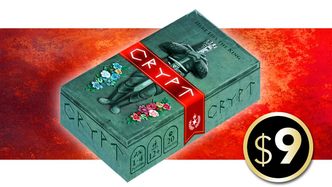 3. Crypt This is a tomb robbing game for 1–4 players, and at $13 ($9 + $4 shipping), the price is right for a gamble. In the world of the game, the king has died, and your goal is to get into his tomb and make off with the riches he can't properly appreciate anymore. (Is this a sequel to Valley of the Kings?) Crypt offers a combination of push-your-luck, dice placement, and set collection, so if any of those sound good to you, give it a look. It's also a very small box game, so if you're the type who likes to slip out the door with a game in your bag, Crypt looks like an interesting possibility. The solo variant was the game's first stretch goal, so hopefully it was already pretty well thought-out before the campaign went live. 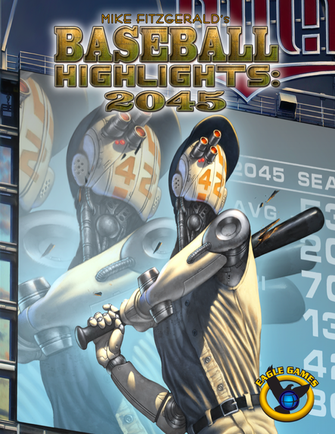 Click here to see a "How to Solo" video for this game! What is this game about? Baseball Highlights: 2045 is set in a futuristic world in which baseball was on the verge of extinction... until the sport changed. Now, natural human baseball players compete alongside cyborgs—humans with modified arms for enhanced skill—and even against full-on robots. It is both a deck building game and a series of baseball-themed minigames. Just like in the World Series, the player who wins the most out of seven games is the ultimate victor. Each player begins with a starting deck of relatively unexciting cards, but they do their job early in the game. Cards can be used to threaten singles, doubles, triples, or even home runs at various speeds. They can also be used to cancel or reduce the damage from runs threatened by the opposing team. Each "baseball" game turns into an intense card duel that is engrossing whether you like baseball or not. Between each mini baseball game, players have a change to upgrade their decks by purchasing "free agents," who are better players with fancier abilities. Because your team can't contain more than 15 players, you retire one card every time you make a new purchase—effectively burning the less effective cards in your deck. 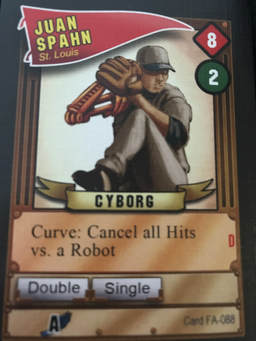 Each card has its own identity and abilities. Each card has its own identity and abilities. How does it play solo? Baseball Highlights: 2045 plays remarkably well as a solo game. To play against an AI player, you create an enemy team made up of 15 free agent cards. You take a regular starter deck for yourself and participate in one to three buy rounds so that you can upgrade it before you start series play. (Otherwise, you are going to get creamed.) The game is more or less difficult to win depending on how many free agents you bring on board before you begin play. Just go ahead and go easy on yourself—this solo mode is no cake walk! Every time I play Baseball Highlights, I am surprised by how often the randomly drawn AI deck seems to stymie me. Also, there is an awesome fan-made solo season campaign on BGG here. It's definitely worth checking out. Overall Thoughts I like deck building games in general, and I particularly like Baseball Highlights: 2045. I wrote about it a couple of years ago, and my positive feelings about the game haven't changed. Baseball Highlights offers quick, intense gameplay during the baseball minigames, and I really enjoy trying to maximize the actions on my cards in an attempt to outsmart my opponent. During the deck building phase, I find myself working with real purpose so that the next minigame is more successful than the last. In most deck building games, I end up buying whatever card works best just to buy another card. But my purchases in Baseball Highlights: 2045, while fewer—you will only be able to afford one or two new players per buy round—are much better thought out. This game is direct and efficient, without any bloat, and I love that I get to both deck build and directly see the results of my strategy in the next baseball game. I am also constantly surprised by just how good the AI player usually is. For a bunch of cards put together without any particular strategy or intent, the AI deck sure kicks my butt sometimes—especially while I am still improving my team. I also sometimes construct decks of free agents whose particular skills meld nicely together, just to give myself an extra challenge. It's not like actual baseball teams don't study each other's players and strategies! Do I recommend it? Yes. Baseball Highlights: 2045 is one of the coolest deck builders out there, and it's great whether or not you enjoy watching baseball. I think every solo gamer should try it at least once. Overall Rating: 5 stars 5 stars — I love it! 4 stars — I really like it. 3 stars — I like it. 2 stars — It's okay. 1 star — Meh. 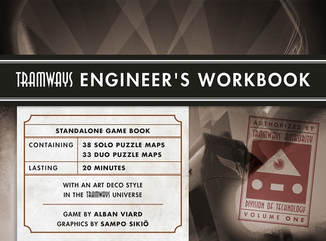 If you want to keep some money in your wallet, definitely avoid Kickstarter right now. Of course, that's pretty much par for the course with Kickstarter. This week is a good one whether you want a puzzle-heavy route-building game or a high-tension, thematic adventure. 1. Tramways Engineer's Workbook Tramways is a game about route building and delivery with a modular board. It's also a little bit of a deck builder in which you acquire with multi-use cards, and it's an all-around good time if you are looking for something to burn your brain. In addition to a reprint of the game, this Kickstarter campaign offers a puzzle book that allows solo or competitive play. Using dry erase markers, you can compete against the designer's scores by creating the most efficient route plans. If you get satisfaction out of efficiency, improvement on past performance, and generally solving logic problems, then the Tramways Engineer's Workbook looks like a great option. This is especially true if you also enjoy games you can play on the go, because all you have to have with you is the book and a dry erase marker.  2. Lifeform Lifeform is a new release designed by Mark Chaplin with collaboration from Tristan Hall, designer of Gloom of Kilforth and 1066: Tears to Many Mothers. Hall's track record alone is enough to make Lifeform worth a look for solo players, but this game also just looks exciting. In Lifeform, you and your friends are unarmed members of a mining crew, and you're trying to survive an extremely hostile alien. In the multiplayer game, the alien is controlled by another player. There is also, however, a solo expansion that will allow you fight for survival against the game itself. And an alien is not the only problem you're dealing with—you also have to find the supplies you need to load up an escape pod before your spaceship self destructs. It looks like a wild ride, and I'm definitely interested if I can find room in my budget! 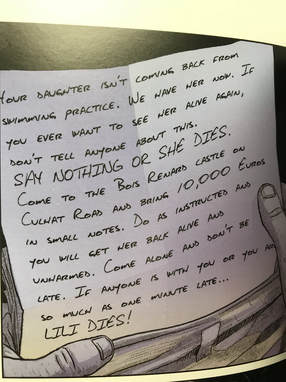 Captive draws you in right away. Captive draws you in right away. A.J. Porfirio of Van Ryder Games kindly sent me a review copy of Captive, which enabled me to write this preview. What is Captive about? Captive is the flagship entry in the Graphic Novel Adventures series, which Van Ryder Games will soon be publishing in the United States. (They have acquired the rights to several adventure books that are already published in French by Makaka Editions.) Each of these books is actually a game in the form of a comic book—you navigate through it by flipping to different numbered panels that represent choices you've made, doors you've opened, and possibly secret places you have noticed and investigated. In Captive, you are a father searching a creepy old house for his long-lost daughter. Although you might describe the book as a "choose your own adventure," and you do get to make several choices throughout the book, I would personally liken it more to one of the point-and-click adventures I loved as a kid. You know, the ones where you have to hunt around to find the best items, and where you occasionally get stuck in dialogue loops because you haven't yet figured out how to progress? Or maybe you could compare it to a visual novel that has several different endings, and you want to replay it multiple times to get each one. Those are the associations that Captive has for me, and that is definitely a good thing. 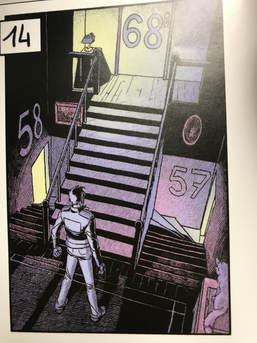 Decisions, decisions. Decisions, decisions. What do I like about Captive? I like a lot about Captive. The story hooked me immediately, and I was on tenterhooks to see what my choices would lead to next. I loved taking notes about what I had seen and found, and generally feeling like I was making progress through a thrilling mystery that couldn't be solved without me. Your choices are not entirely straightforward, left-or-right-door affairs. You also have to look carefully at each panel, because you never know where you might find a clue, item, or secret area that you could miss if you aren't being thorough in your investigation. Although some of the mystery vanishes with each playthrough, I went through Captive several times in search of every item, every branching pathway, every scrap of interesting flavor text. It's rare that I am that engaged with a game I am playing, and I will definitely be picking up the rest of the series so I can feel that rush again. Possible Concerns About Captive With a game like Captive, you have to face reality: There is a limited number of times you can play it, and it's only truly fresh the first time. Because it is a book that is also a game, you will eventually suck all of the marrow out of its bones. For me, that isn't a problem. If I had bought the book, I would have felt that I had gotten my money's worth—so much so that I personally backed the full set of Graphic Novel Adventures on Kickstarter. But if replayability is your priority, you might want to think twice before backing this project. The other possible difficulty is that if you miss a crucial clue, or lose track of where you have been, it is possible to get stuck in Captive. I assume that will be true for the other Graphic Novel Adventures. There were a couple of investigative loops I got lost in that temporarily killed my momentum, and there were crucial items and pieces of information I missed the first time around that had a huge impact on my game. If anything, it made me feel nostalgic—I sort of enjoy getting stuck during a puzzle and methodically working my way out of it. But if you know that this would drive you crazy, you've been warned. Should I Back It? If you like gamebooks, choose-your-own-adventure books, visual novels, or point-and-click games, then I think Graphic Novel Adventures is a great match for you. Captive is perfect for one person, easy to play on the go, well-constructed, and exciting. I have no doubt its fellow Graphic Novel Adventures will be equally appealing. I am really looking forward to giving the set a full review. If you want to see a video tour of Captive (with no more "spoilers" than you've already seen in this post), I've made one! 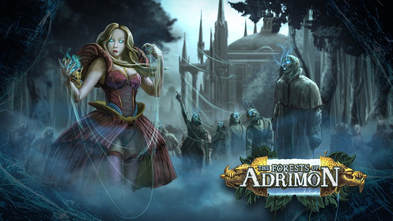 If you like large-scale solo games with a lot of exploration, this may be an interesting time on Kickstarter for you. 1. HEXplore It: The Forests of Adrimon I recently reviewed the first installment in the HEXplore It series, The Valley of the Dead King. It was very good—definitely good enough to make me think about backing The Forests of Adrimon. It would be an instaback if I weren't broke right now. In VotDK, players were able to combine their role (i.e. class) and race to create interesting combinations of character skills. This next installment is no different, with plenty of new races and classes to try. There are also new ways to power up your characters, since you can now reconstruct relics as well as draw power up cards that increase your character's stats. My only complaint is that I wish the evil sorceress weren't missing a rather crucial part of her skirt. At that point, why even bother? 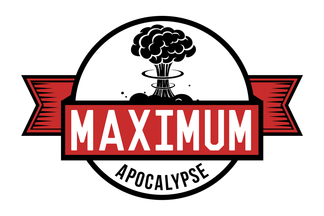 2. Maximum Apocalypse (Gothic Horrors Expansion + Reprint) If you missed Maximum Apocalypse the first time around (I did), you now have a second crack at it. This is a roguelike survival horror game that will play out differently each time. Players work together to explore, scavenge, survive monster attacks, and complete game scenarios. Players may also choose from a variety of character types, so you can test out different strategies and play styles. The all-in rookie pledge is about $90, however, so it's another big hit to the wallet. 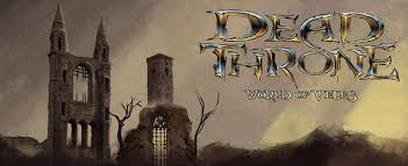 3. Dead Throne Dead Throne claims to be an open world board game with an innovative "mechanical market." (Basically, market cards can be slotted into the game's lid and locked in place.) This game promises a seamless adventuring experience for 1–7 players, but I will be honest—I'd rather see more gameplay videos from previewers who aren't associated with the project. This seems to be Sharkee Games' first venture, and it looks ambitious AF. With a base price tag of $126, Dead Throne would a huge purchase, and I don't personally feel like I've been given enough information to back the project comfortably. At this point, however, it is going to fund, so if you want in... |
AuthorMy name is Liz Davidson, and I play solo board games. A lot of solo board games... Archives
August 2021
Categories
All
|
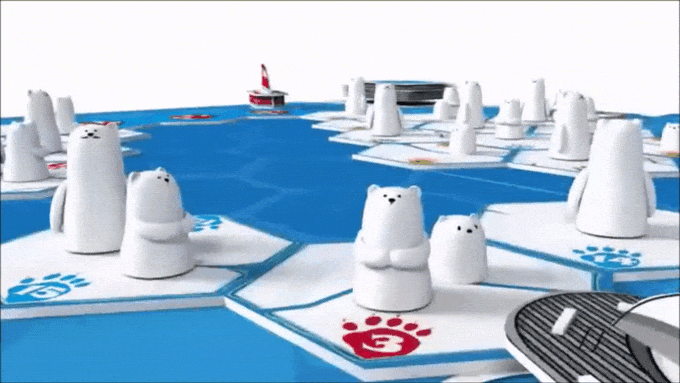

 RSS Feed
RSS Feed